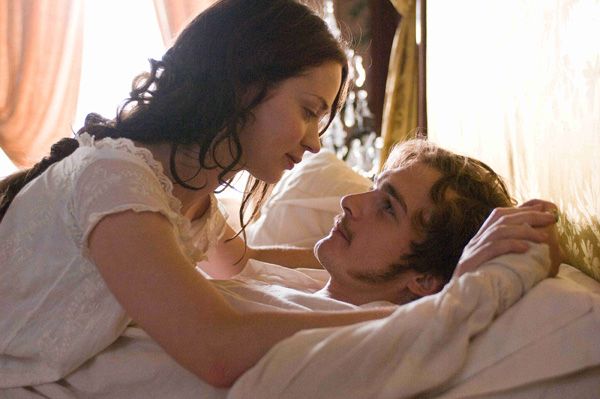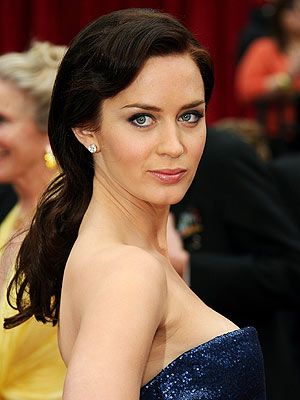Emily Blunt shot to international prominence with her lead role in the multi award-winning British movie, My Summer of Love, in which she played a mysterious, privileged woman who becomes the object of fascination of a local girl. In the critically acclaimed Gideon's Daughter, she played the troubled daughter of a man who gives the impression of being more dedicated to his career and girlfriend than her. And, in The Devil Wears Prada, she was the intensely neurotic, senior assistant at Runway Magazine, under Meryl Streep's ruthless editor-in-chief.
With The Wolfman and Gulliver's Travels already on her schedule for 2010 (read what she had to say here), Emily Blunt certainly has a fast-rising career. While at the press day for her latest release, the historical period drama, The Young Victoria, about the early life and reign of the iconic British queen, Emily Blunt talked about humanizing royalty. Check out what she had to say after the jump:
Question: How did you first hear about The Young Victoria?
Emily: My agent sent me the script and I really fell in love with her and the script. I thought it was really rare, in that it wasn't too arch and stiff. It seemed to be a very intimate portrait of a girl, rather than a queen. She was a girl who was under duress and huge pressure, and she was in love, so there was so much to play with and I knew it was such a rare find. I had to be quite pushy about getting them to cast me.
How was it to work with both Rupert Friend and Paul Bettany?
Emily: The relationship with Melbourne was the more ambiguous one, so that was the one that was harder to play. With Albert, they definitely had a connection. With Victoria and Albert, it was very much a meeting of souls. They instantly had a spark together. Whereas with the Melbourne character, that was trickier to place, so you wanted the ambiguity of him being a father figure that she was kind of infatuated by, but there wasn't really anything sordid going on ever. He actually loved her, but was still using her. It was a complicated relationship, where the trust wasn't there, at the end of the day. She trusted him at first and that got betrayed. That was more complicated to pin down. But, Paul is a great playmate for that. He's able to create nuances, so that you're not quite sure what that relationship is. But, with Rupert, we had a very similar approach to these characters. Love is one of those things that can't be influenced by the fact that you're wearing a bonnet or a corset. It's lasted this long, and it will continue to be the driving force of people's emotions and instincts, and so that's what we tried to remember. We didn't want to be swallowed up by the sets and the costumes. We wanted to let it have a contemporary flare, so that people could identify with it, as they should. Just because I'm wearing a big gown doesn't mean that I can't have a fight with my husband, and a real fight that people have. People get that.
Were you shocked when you found out that the director for this film about a British queen would be a French Canadian from Montreal?
Emily: I think I was, briefly. I remember saying, "God, that's interesting." And then, I met him. We had breakfast in L.A., at Shutters hotel, and we sat and ate eggs benedict. He was so funny and sweet with this big eyes that were full of passion and zest for life. He said, "You know, she was a rebel," and I was like, "This guy is so great. What a great, fresh approach!" Who on earth would have described Victoria like that? So, he was really the only guy for the job, at the end of the day, because not only does he have a very dynamic aesthetic, but he really understands what actor's needs are. He would play music on the set. It was a very atmospheric set with a real ambiance to it. He was wonderful like that, and really cool.
What did you know about Queen Victoria, before making the film?
Emily: I didn't know very much. I knew about the old lady with the thing on her head, looking really grumpy. I knew that she wore black and she had nine children. And, I knew that Albert had died young. That's all I knew. I remember my mom telling me about the fact that they had this incredibly loving, passionate relationship, when I was a kid. But then, when I started reading about her, I was so surprised to see that she was the antithesis to what I imagined her to be. Everyone knows about the mourning and the grief, but no one knows why. That's what this film allows for. People can actually get some understanding as to why she laid out his clothes for the rest of her life and why she wore black for the rest of her life. When he died, she literally said, "How am I supposed to go on when half of my soul is gone? How am I supposed to live when half of my soul does not exist anymore?" And, she really meant it. She never recovered. I think that's what I loved about the film. It gives people an indication as to why she mourned him as ferociously as she did.
Being British yourself, do you have more pressure on you when playing such an iconic character?
Emily: Yes, because you want to do her justice, since she's very much emblematic of our country, and everything that her and Albert did together, what they achieved and how much they did for education, social reform, architecture, the arts, the sciences and all of it. They did so much for the country. So, it's important to try to show her in the best light you can, but also to create a real person and try not to approach her as the Queen. I don't know what it's like to be the Queen of England. Hardly anyone does. But, at the end of the day, there's a human side to everyone. She was a young girl who was in love for the first time, in a job where she felt completely intimidated and over her head, and a lot of people can relate to that. A lot of people remember what it's like to be in love for the first time, and some people have come from a dysfunctional family. I feel like this film is actually about a dysfunctional family, at the end of the day.


.jpg)

.jpg)
